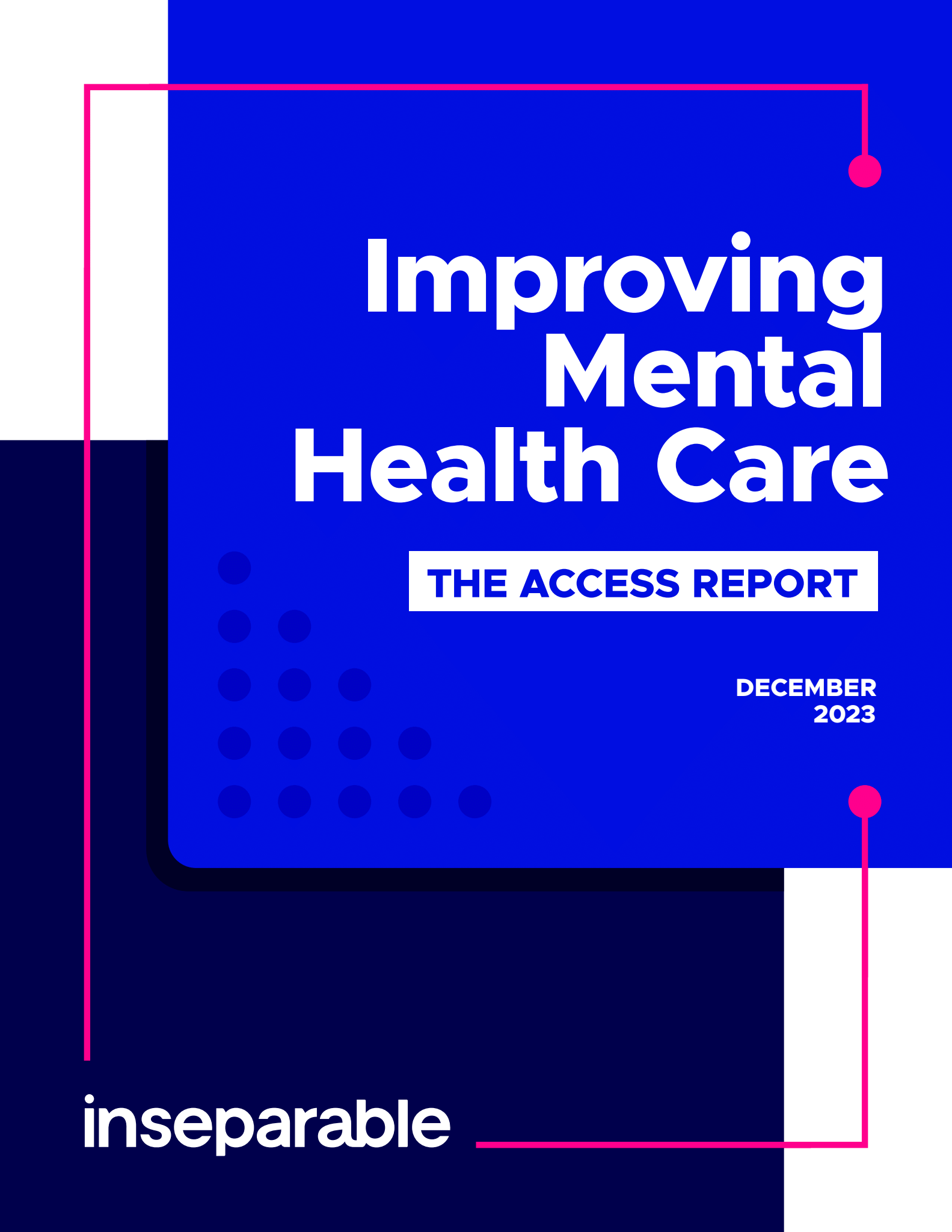Policies to Improve Access & Coverage of Mental Health Care
People in every state and every community agree that America’s mental health care system is falling short. Poll after poll reveals that mental health is top of mind for Americans. They are worried about their own mental health and their families’. They need better access to care. And they want their elected leaders to treat this issue with urgency.
More than 2 in 3
Only 1 in 3 people
who visit the ER or hospital for mental health or substance use treatment get follow-up care within 30 days
1 in 5 people
had a mental health condition in the past year
State Scorecards
Understand your state’s progress in adopting state policies that make mental health care easier to find, easier to pay for, and more effective. For insights on these policy benchmarks, read this overview.
[{"state":"Alabama","link":"https:\/\/www.inseparable.us\/wp-content\/uploads\/2023\/12\/Inseparable-2023AccessReport-AL-12.18.23.pdf","label":"See Scorecard"},{"state":"Alaska","link":"https:\/\/www.inseparable.us\/wp-content\/uploads\/2023\/12\/Inseparable-2023AccessReport-AK-12.18.23.pdf","label":"See Scorecard"},{"state":"Arizona","link":"https:\/\/www.inseparable.us\/wp-content\/uploads\/2023\/12\/Inseparable-2023AccessReport-AZ-12.18.23.pdf","label":"See Scorecard"},{"state":"Arkansas","link":"https:\/\/www.inseparable.us\/wp-content\/uploads\/2023\/12\/Inseparable-2023AccessReport-AR-12.18.23.pdf","label":"See Scorecard"},{"state":"California","link":"https:\/\/www.inseparable.us\/wp-content\/uploads\/2023\/12\/Inseparable-2023AccessReport-CA-12.18.23.pdf","label":"See Scorecard"},{"state":"Colorado","link":"https:\/\/www.inseparable.us\/wp-content\/uploads\/2023\/12\/Inseparable-2023AccessReport-CO-12.18.23.pdf","label":"See Scorecard"},{"state":"Connecticut","link":"https:\/\/www.inseparable.us\/wp-content\/uploads\/2023\/12\/Inseparable-2023AccessReport-CT-12.18.23.pdf","label":"See Scorecard"},{"state":"Delaware","link":"https:\/\/www.inseparable.us\/wp-content\/uploads\/2023\/12\/Inseparable-2023AccessReport-DE-12.18.23.pdf","label":"See Scorecard"},{"state":"District of Columbia","link":"https:\/\/www.inseparable.us\/wp-content\/uploads\/2023\/12\/Inseparable-2023AccessReport-DC-12.18.23.pdf","label":"See Scorecard"},{"state":"Florida","link":"https:\/\/www.inseparable.us\/wp-content\/uploads\/2023\/12\/Inseparable-2023AccessReport-FL-12.18.23.pdf","label":"See Scorecard"},{"state":"Georgia","link":"https:\/\/www.inseparable.us\/wp-content\/uploads\/2023\/12\/Inseparable-2023AccessReport-GA-12.18.23.pdf","label":"See Scorecard"},{"state":"Hawaii","link":"https:\/\/www.inseparable.us\/wp-content\/uploads\/2023\/12\/Inseparable-2023AccessReport-HI-12.18.23.pdf","label":"See Scorecard"},{"state":"Idaho","link":"https:\/\/www.inseparable.us\/wp-content\/uploads\/2023\/12\/Inseparable-2023AccessReport-ID-12.18.23.pdf","label":"See Scorecard"},{"state":"Illinois","link":"https:\/\/www.inseparable.us\/wp-content\/uploads\/2023\/12\/Inseparable-2023AccessReport-IL-12.18.23.pdf","label":"See Scorecard"},{"state":"Indiana","link":"https:\/\/www.inseparable.us\/wp-content\/uploads\/2023\/12\/Inseparable-2023AccessReport-IN-12.18.23.pdf","label":"See Scorecard"},{"state":"Iowa","link":"https:\/\/www.inseparable.us\/wp-content\/uploads\/2023\/12\/Inseparable-2023AccessReport-IA-12.18.23.pdf","label":"See Scorecard"},{"state":"Kansas","link":"https:\/\/www.inseparable.us\/wp-content\/uploads\/2023\/12\/Inseparable-2023AccessReport-KS-12.18.23.pdf","label":"See Scorecard"},{"state":"Kentucky","link":"https:\/\/www.inseparable.us\/wp-content\/uploads\/2023\/12\/Inseparable-2023AccessReport-KY-12.18.23.pdf","label":"See Scorecard"},{"state":"Louisiana","link":"https:\/\/www.inseparable.us\/wp-content\/uploads\/2023\/12\/Inseparable-2023AccessReport-LA-12.18.23.pdf","label":"See Scorecard"},{"state":"Maine","link":"https:\/\/www.inseparable.us\/wp-content\/uploads\/2023\/12\/Inseparable-2023AccessReport-ME-12.18.23.pdf","label":"See Scorecard"},{"state":"Maryland","link":"https:\/\/www.inseparable.us\/wp-content\/uploads\/2023\/12\/Inseparable-2023AccessReport-MD-12.18.23.pdf","label":"See Scorecard"},{"state":"Massachusetts","link":"https:\/\/www.inseparable.us\/wp-content\/uploads\/2023\/12\/Inseparable-2023AccessReport-MA-12.18.23.pdf","label":"See Scorecard"},{"state":"Michigan","link":"https:\/\/www.inseparable.us\/wp-content\/uploads\/2023\/12\/Inseparable-2023AccessReport-MI-12.18.23.pdf","label":"See Scorecard"},{"state":"Minnesota","link":"https:\/\/www.inseparable.us\/wp-content\/uploads\/2023\/12\/Inseparable-2023AccessReport-MN-12.18.23.pdf","label":"See Scorecard"},{"state":"Mississippi","link":"https:\/\/www.inseparable.us\/wp-content\/uploads\/2023\/12\/Inseparable-2023AccessReport-MS-12.18.23.pdf","label":"See Scorecard"},{"state":"Missouri","link":"https:\/\/www.inseparable.us\/wp-content\/uploads\/2023\/12\/Inseparable-2023AccessReport-MO-12.18.23.pdf","label":"See Scorecard"},{"state":"Montana","link":"https:\/\/www.inseparable.us\/wp-content\/uploads\/2023\/12\/Inseparable-2023AccessReport-MT-12.18.23.pdf","label":"See Scorecard"},{"state":"Nebraska","link":"https:\/\/www.inseparable.us\/wp-content\/uploads\/2023\/12\/Inseparable-2023AccessReport-NE-12.18.23.pdf","label":"See Scorecard"},{"state":"Nevada","link":"https:\/\/www.inseparable.us\/wp-content\/uploads\/2023\/12\/Inseparable-2023AccessReport-NV-12.18.23.pdf","label":"See Scorecard"},{"state":"New Hampshire","link":"https:\/\/www.inseparable.us\/wp-content\/uploads\/2023\/12\/Inseparable-2023AccessReport-NH-12.18.23.pdf","label":"See Scorecard"},{"state":"New Jersey","link":"https:\/\/www.inseparable.us\/wp-content\/uploads\/2023\/12\/Inseparable-2023AccessReport-NJ-12.18.23.pdf","label":"See Scorecard"},{"state":"New Mexico","link":"https:\/\/www.inseparable.us\/wp-content\/uploads\/2023\/12\/Inseparable-2023AccessReport-NM-12.18.23.pdf","label":"See Scorecard"},{"state":"New York","link":"https:\/\/www.inseparable.us\/wp-content\/uploads\/2024\/07\/Inseparable-2023AccessReport-NY-07.12.24.pdf","label":"See Scorecard"},{"state":"North Carolina","link":"https:\/\/www.inseparable.us\/wp-content\/uploads\/2023\/12\/Inseparable-2023AccessReport-NC-12.18.23.pdf","label":"See Scorecard"},{"state":"North Dakota","link":"https:\/\/www.inseparable.us\/wp-content\/uploads\/2023\/12\/Inseparable-2023AccessReport-ND-12.18.23.pdf","label":"See Scorecard"},{"state":"Ohio","link":"https:\/\/www.inseparable.us\/wp-content\/uploads\/2023\/12\/Inseparable-2023AccessReport-OH-12.18.23.pdf","label":"See Scorecard"},{"state":"Oklahoma","link":"https:\/\/www.inseparable.us\/wp-content\/uploads\/2023\/12\/Inseparable-2023AccessReport-OK-12.18.23.pdf","label":"See Scorecard"},{"state":"Oregon","link":"https:\/\/www.inseparable.us\/wp-content\/uploads\/2023\/12\/Inseparable-2023AccessReport-OR-12.18.23.pdf","label":"See Scorecard"},{"state":"Pennsylvania","link":"https:\/\/www.inseparable.us\/wp-content\/uploads\/2023\/12\/Inseparable-2023AccessReport-PA-12.18.23.pdf","label":"See Scorecard"},{"state":"Rhode Island","link":"https:\/\/www.inseparable.us\/wp-content\/uploads\/2023\/12\/Inseparable-2023AccessReport-RI-12.18.23.pdf","label":"See Scorecard"},{"state":"South Carolina","link":"https:\/\/www.inseparable.us\/wp-content\/uploads\/2023\/12\/Inseparable-2023AccessReport-SC-12.18.23.pdf","label":"See Scorecard"},{"state":"South Dakota","link":"https:\/\/www.inseparable.us\/wp-content\/uploads\/2023\/12\/Inseparable-2023AccessReport-SD-12.18.23.pdf","label":"See Scorecard"},{"state":"Tennessee","link":"https:\/\/www.inseparable.us\/wp-content\/uploads\/2023\/12\/Inseparable-2023AccessReport-TN-12.18.23.pdf","label":"See Scorecard"},{"state":"Texas","link":"https:\/\/www.inseparable.us\/wp-content\/uploads\/2023\/12\/Inseparable-2023AccessReport-TX-12.18.23.pdf","label":"See Scorecard"},{"state":"Utah","link":"https:\/\/www.inseparable.us\/wp-content\/uploads\/2023\/12\/Inseparable-2023AccessReport-UT-12.18.23.pdf","label":"See Scorecard"},{"state":"Vermont","link":"https:\/\/www.inseparable.us\/wp-content\/uploads\/2023\/12\/Inseparable-2023AccessReport-VT-12.18.23.pdf","label":"See Scorecard"},{"state":"Virginia","link":"https:\/\/www.inseparable.us\/wp-content\/uploads\/2023\/12\/Inseparable-2023AccessReport-VA-12.18.23.pdf","label":"See Scorecard"},{"state":"Washington","link":"https:\/\/www.inseparable.us\/wp-content\/uploads\/2023\/12\/Inseparable-2023AccessReport-WA-12.18.23.pdf","label":"See Scorecard"},{"state":"West Virginia","link":"https:\/\/www.inseparable.us\/wp-content\/uploads\/2023\/12\/Inseparable-2023AccessReport-WV-12.18.23.pdf","label":"See Scorecard"},{"state":"Wisconsin","link":"https:\/\/www.inseparable.us\/wp-content\/uploads\/2023\/12\/Inseparable-2023AccessReport-WI-12.18.23.pdf","label":"See Scorecard"},{"state":"Wyoming","link":"https:\/\/www.inseparable.us\/wp-content\/uploads\/2023\/12\/Inseparable-2023AccessReport-WY-12.18.23.pdf","label":"See Scorecard"}]
Improving Mental Health Care in America: The Access Report
State policymakers across the country have the power to improve access to mental health care by championing and passing key policies that help:
- Expand coverage of care
- Leverage the mental health workforce
- Promote prevention and early intervention
Policy Recommendations
Health care coverage is crucial to improving access to mental health services. Expanding coverage means more than simply making sure more people can get insurance, it also means guaranteeing the insurance they have covers the treatment they need. Policies to accomplish this include:
- Require coverage of all medically necessary treatment
- Require coverage for out-of-network care
- Mandate accurate provider directories
- Insure more people through Medicaid
- Ensure continuous Medicaid coverage
- Extend Medicaid coverage to people in prison or jail
While there is no doubt we need to widen the pipeline of future providers, the following policies offer opportunities to better leverage the existing workforce. To accomplish this, state policymakers can:
- Expand the use of telemental health
- Adjust state licensure requirements
- Promote the use of peer and behavioral support specialists
- Provide fair reimbursement rates for providers
Study after study shows both prevention and early intervention are effective in reducing and addressing mental health conditions, and can help lower health care costs over time. To support young people and adults in getting treatment early, states can adopt policies that:
- Cover annual mental health screenings and wellness exams
- Waive formal diagnosis requirements for mental health care
- Address the impact of social determinants of health
- Integrate mental health care with primary care
Resources
Milliman Report: Access Across America
State-by-state insights into the accessibility of care for mental health and substance use disorders
Gorem ipsum
Vestibulum vitae purus vel leo auctor aliquet vitae ut felis. Duis varius lacus velit, ut accumsan tellus suscipit eget. Ut dictum varius magna a vehicula. Pellentesque a elementum massa, eget pulvinar purus. Aenean eu dui at sem suscipit bibendum.
